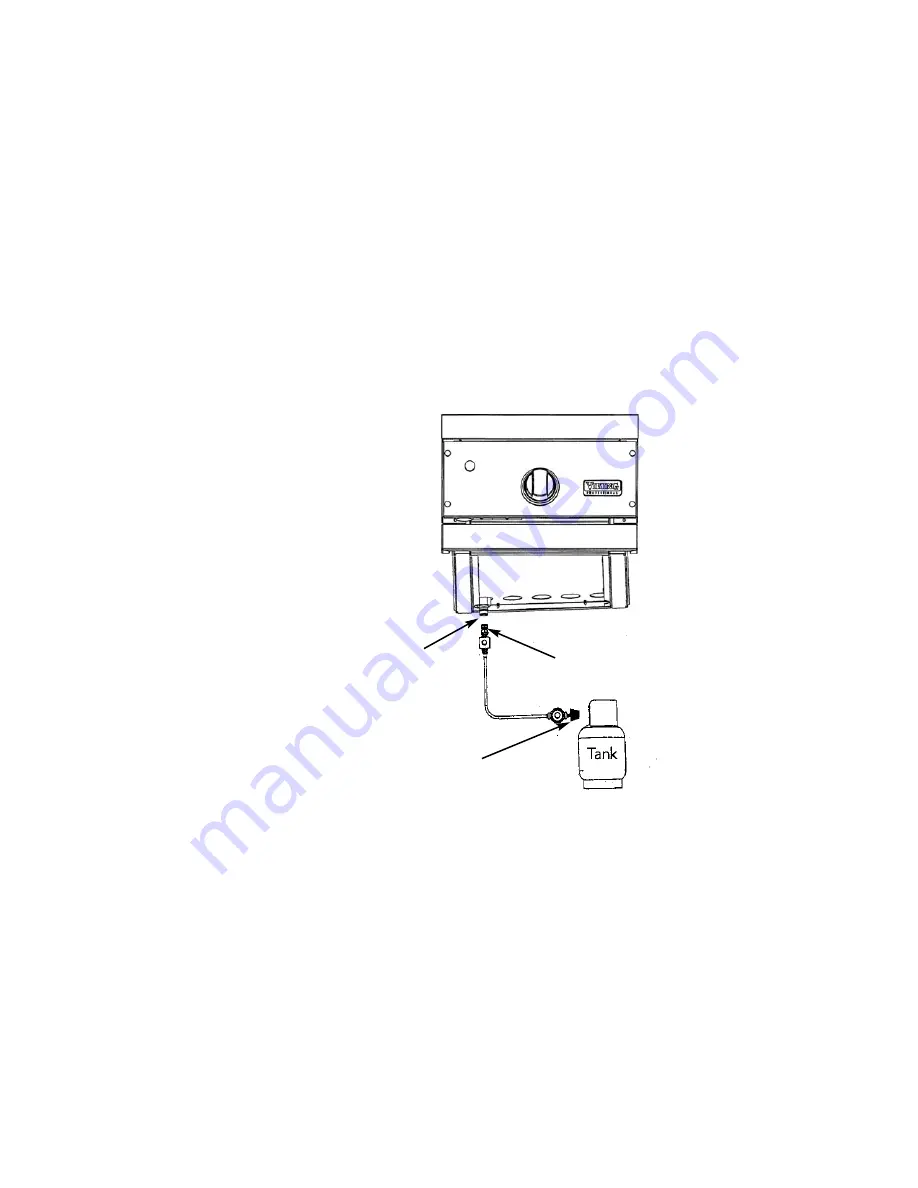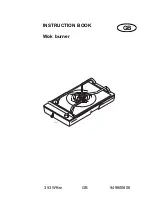
6
LLP
P//P
PR
RO
OP
PA
AN
NE
E T
TA
AN
NK
K C
CO
ON
NN
NE
EC
CT
TIIO
ON
N
Outdoor side burners orificed for use with LP/Propane gas come equipped with a high capacity hose/regulator assembly
for connection to a standard 20 lb. LP/Propane cylinder e
eq
qu
uiip
pp
pe
ed
d w
wiitth
h aa T
Tyyp
pe
e 1
1,, Q
QC
CC
C--1
1 cco
on
nn
ne
ecctto
orr.. Hose assembly must
comply with
Elastomeric Composite Hose and Couplings for Conducting Propane and Natural Gas, CAN/CGA-8.1 standard
or the
Theromplastic Hose and Hose Couplings for Conducting Propane and Natural Gas CAN1-8.3 standard (See
LP/Propane tank requirements below). Each tank is supplied with a dust cap. Place dust cap on cylinder valve outlet
whenever the cylinder is not in use. Only install the type of dust cap on the cylinder valve outlet that is provided with the
cylinder valve. Other types of caps or plugs may result in leakage of propane.
Connection: 1/2” (1.3 cm) NPT male with a 3/8” (.95) flare adapter
Operating Pressure: 10.0” W.C.P.
To connect to LP/Propane regulator/hose assembly:
Although the flow of gas is stopped when the connector is disconnected as part of its safety feature, you should
always turn the LP/Propane tank main valve “OFF” after each use and during transport of the tank or unit. First
connect the regulator to the grill unit by screwing the 3/8” flare coupling to the 3/8” flare adapter. Connect to the
tank valve by screwing the Type 1, QCC-1 connector to the LP/Propane tank. Open the tank valve and check the
connection between the regulator and the Type 1, QCC-1 fitting for leaks with a soapy water solution. If bubbles
appear, tighten the connection. Repeat until all leaks have been stopped. A
ALLW
WA
AY
YS
S C
CH
HE
EC
CK
K F
FO
OR
R LLE
EA
AK
KS
S A
AF
FT
TE
ER
R
E
EV
VE
ER
RY
Y LLP
P//P
PR
RO
OP
PA
AN
NE
E T
TA
AN
NK
K C
CH
HA
AN
NG
GE
E.. A
An
nyy jjo
oiin
ntt sse
eaallaan
ntt u
usse
ed
d m
mu
usstt b
be
e aan
n aap
pp
prro
ovve
ed
d ttyyp
pe
e aan
nd
d b
be
e rre
essiissttiivve
e tto
o tth
he
e
aaccttiio
on
nss o
off LLP
P//P
Prro
op
paan
ne
e g
gaass
3/8” flare
adapter
Type 1, QCC-1
connector
3/8” flare coupling
LLP
P//P
PR
RO
OP
PA
AN
NE
E T
TA
AN
NK
K R
RE
EQ
QU
UIIR
RE
EM
ME
EN
NT
TS
S
A dented or rusty LP/Propane tank may be hazardous and should be checked by your tank supplier. Never use a
cylinder with a damaged valve. All tanks should be equipped with an OPD (overfilling protection device). This is a DOT
requirement for all tanks purchased after October 1, 1998 and will ensure that the tank is not overfilled. The LP/Propane
tank should be a standard 5-gal, 20 lb. gas cylinder tank approximately 12” in diameter and 18” high which must be
constructed and marked in accordance with the
Specifications for LP/Propane Gas Cylinders of the U.S. Department of
Transportation (D.O.T.) or the National Standard of Canada,
CAN/CSA-B339, Cylinders, Spheres and Tubes for
Transportation of Dangerous Goods; and Commission. The cylinder connection device must be compatible with the Type
1, QCC-1 connector on the outdoor cooking appliance. The cylinder must be provided with a shut-off valve terminating in
an LP/Propane gas supply cylinder valve outlet specified. The cylinder supply system must be arranged for vapor
withdrawal and provided with a listed overfilling prevention device. If the appliance is stored indoors the cylinder must be
disconnected and removed from the appliance. Do not store a spare LP-gas cylinder under or near this appliance. Each
tank is supplied with a dust cap. Place dust cap on cylinder valve outlet whenever the cylinder is not in use. Only install
the type of dust cap on the cylinder valve outlet that is provided with the cylinder valve. Other types of caps or plugs may
result in leakage of propane. Cylinders must be stored outdoors in a well-vented area out of the reach of children.
*Tank must be mounted in
vertical position for proper
ventilation
Summary of Contents for TruSear VGIB151T
Page 15: ...15 ...


































